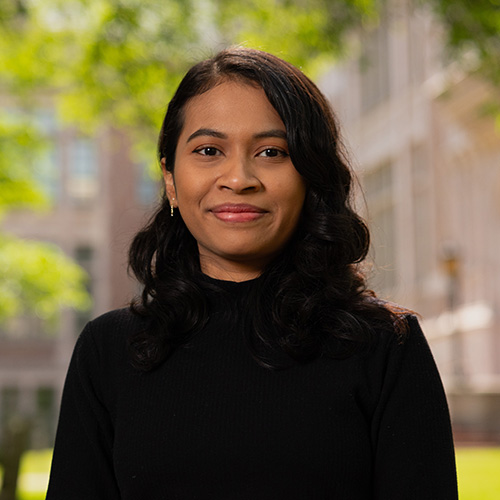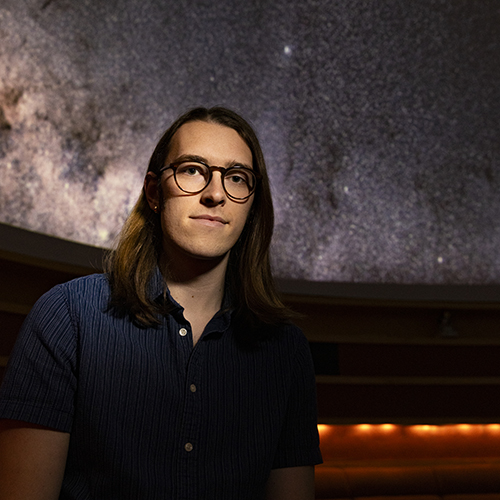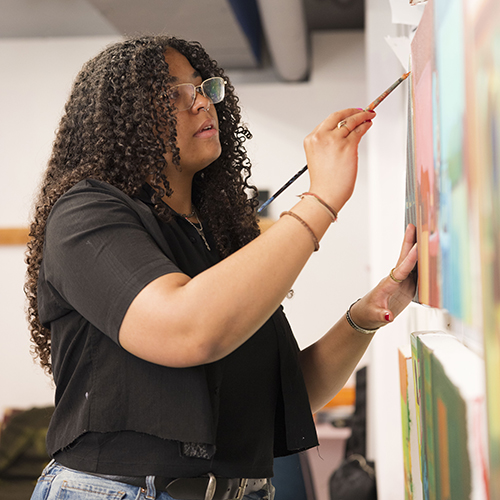Elizabeth Sodbinow spent years healing other people, first as a U.S. Air Force nurse and later as a nurse anesthetist and colonel in the Air Force Reserve. She traveled on health care missions to Armenia, Uzbekistan, Guyana, and South Korea. But at age 48, Sodbinow suffered a health crisis of her own: a stroke that left her unable to communicate.
Like many stroke survivors, Sodbinow has aphasia — a communication disorder resulting from a brain injury in the left cerebral hemisphere. “I was on hold for years because of my impairments and my speech deficit,” she recalls. After Sodbinow joined a Veteran’s Administration (VA) aphasia research study led by UW Professor Diane Kendall, she saw real improvement.
“Aphasia is a language network issue,” explains Kendall, chair of the UW Department of Speech and Hearing Sciences and research scientist at the VA Medical Center. “People with aphasia can hear but can’t decode the words and what they mean. And they may understand some commonly used words while not understanding other longer, more complex words, like a traveler hearing an unfamiliar language with a few familiar words.”

For decades, aphasia treatment involved relearning language one word at a time, with single words sometimes taking several hours to master. Given the thousands of words in a normal vocabulary, and the complexity of combining them into sentences and paragraphs, patients’ progress was often severely limited. Kendall thought there might be a better way. With grant support from the Veterans Administration, she began developing a new treatment.
Instead of the traditional word-based therapy, Kendall favored a phonological approach similar to childhood language development. She thought patients should first relearn individual sounds and sound sequences, and then use those as building blocks to map letters and whole words. Her hope was that patients treated in this way would then be able to decipher words more generally, rather than painstakingly learning one word at a time. She and a team of speech language pathologists began treating patients at the VA using this approach, working with each patient for six weeks, in two-hour sessions five days a week. The results were just as Kendall had hoped.
We take for granted our ability to communicate. It is an elegant dance that we do every minute, every hour, every day of our lives.
“When we brought people back three months later for a follow-up, they were even better than when they left treatment because they’d been out in the world practicing in a natural context using those building blocks,” says Kendall. “It’s similar to the early phases of childhood language development.”
Kendall has spent nearly two decades refining her treatment approach, with grant support from the VA. While she is sanguine about advances in aphasia treatment, she recognizes that individual improvement is incremental and varies widely depending on the severity of a patient’s stroke. Some patients’ neural networks are too severely damaged to make significant progress. Others, like Sodbinow, are able to converse and read with far less difficulty after treatment.
“We don’t know how an individual will respond until we start working with them,” says Kendall. “Even for those who respond well, it’s slow going. Aphasia is pervasive and enduring. You can never cure it. The best you can do is make people functional.”

While Kendall oversees the research, she also treats aphasia patients herself. “That’s why I’m here,” she says. “I love working one-on-one, helping someone talk or read or write.” Although Kendall enjoys all her patients, she admits to a special fondness for veterans.
“Veterans are my people,” she says. “My brother is a veteran. The way veterans deal with a stroke is different than non-veterans. There’s a resilience. They’ve seen worse than this stroke. They’re tough. They attack it, like game on.”
Of course even the toughest vet will be thrown by the onset of aphasia. The sudden loss of language is emotionally devastating for anyone. “We take for granted our ability to communicate,” says Kendall. “It is an elegant dance that we do every minute, every hour, every day of our lives. Our brains do it and we don’t even know it’s happening. To have that suddenly taken away — literally you’re fine at noon, and you have a stroke at 1 o’clock and lose your language — is devastating. There’s a mourning of it, a sense of grief.”
That mourning extends to family members whose lives are also impacted dramatically. Recognizing this, Kendall and her colleagues lead a monthly support group for aphasia caregivers through Young Adult Stroke Survivors (YASS) at Northwest Hospital. YASS also offers support groups for aphasia patients.
But mostly Kendall is determined to help aphasia patients regain as much language as possible. Having refined her therapy, she now hopes to implement it more broadly — starting with the UW Speech and Hearing Clinic in the UW Department of Speech and Hearing Sciences. Kendall hopes that, within a few years, graduate students in the department will offer the therapy as part of their training.
Elizabeth Sodbinow applauds Kendall’s efforts to reach more people. After all, she knows firsthand how life-changing aphasia therapy can be.
“Now my aphasia is mild,” Sodbinow says, adding that the improvement has benefited both her personal and professional life. “My family is closer, and I’m taking nursing classes at the UW again, working toward a PhD. I’m very thankful to have been part of this research.”
More Stories

Balancing Sci-Fi and Scholarship
Speculative fiction author Anselma Prihandita (PhD, language and rhetoric, 2025), a Nebula Award winner, finds that her creative writing bolsters her scholarly work in unexpected ways.

Tracking Comets, and Other Celestial Adventures
Using a powerful research telescope, astronomy and physics major Max Frissell identified a never-before-seen active comet. Now he’s hooked.

Making Art, Making Connections
While at the UW, artist Kyra Wolfenbarger was a researcher, museum intern, and arts writer. What shaped her most were the people she met along the way.